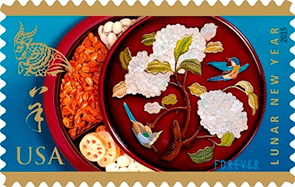Talking Points
February 17 - March 3, 2015
Happy Year of the ? 祝羊年快乐!
Tonight is the eve of the lunar new year. We hope that you and those you care about have a great holiday and that the Year of the 羊 (yang) is a great one for all of us. So is this the year of sheep? The year of the goat? The year of the ram? You'll see all of these animals represented in the lunar new year stamps issued by Asian nations, not to mention those issued elsewhere in the world.
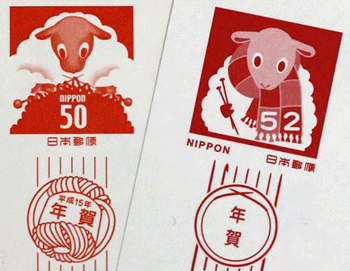 |
Since we’re the U.S.-China Institute, we ordinarily begin our lunar new year stamp collection with stamps issued by those countries. But this year, pride of place has to go to Japan. As you know, the cycle takes twelve years. In 2003, the Japanese postal authorities issued this printed card, a clever design with a sheep knitting something. This year our sheep is sporting a nice new scarf.
Japan, incidentally, issued the first of its lottery new year's greeting cards in 1949. The People's Republic of China did not begin issuing new year stamps until 1980. This, in fact, was a major undertaking. The Chinese Communist Party officially promoted a break from traditional ways, ending family-centered farming and business. When the Cultural Revolution was launched in 1966, one of the targets for destruction were the "four olds" 四旧: old customs, old culture, old habits, and old ideas. The government canceled the three-day lunar new year holiday in 1967 (a 羊 yang year like this year). People were told to not observe the new year in the usual ways, but to embrace the ideals of the Cultural Revolution. Lavish meals, firecrackers, and so on were out; frugality was in. Instead of hanging traditional couplets at their doors, people were to recite the political slogans of the hour.
It was only after Mao Zedong's death and the consolidation
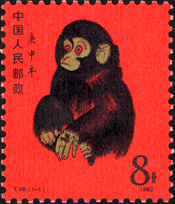 |
of power by Deng Xiaoping that this changed. In December 1978, the CCP sanctioned a return to family-based farming through the household responsibility system. The economic reforms were underway. And in 1980, the three-day lunar new year holiday was restored and the People's Republic issued its first lunar new year stamp, a monkey painted by the celebrated artist Huang Yongyu 黄永玉.
The CCP's predecessors the Kuomintang (KMT) or Nationalists had also experimented with a break from the lunar new year tradition. In 1928, it pushed to make January 1 the main occasion for celebrations. Society pushed back and the KMT relented. By 1965, the KMT was running only Taiwan and the postal authorities there issued the first Republic of China lunar new year's stamp. The U.S. began issuing lunar new year stamps in 1992.
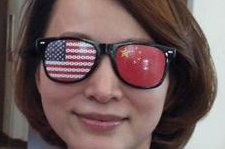 |
This evening, most Chinese television viewers will tune in the Spring Festival Gala on CCTV. Dong Qing 董卿 is returning to host the program after a stint as a visiting scholar here at USC. The party-state agenda remains a part of the celebration. CCTV has said anti-corruption messages will be highlighted during the program.
****
The U.S. rolled out its year of the ram stamps in Chinese communities in several cities last week. In 2003, it issued 70 million ram stamps. To illustrate the decline in the use of stamps for postage, though probably not a decline in interest in the stamps from collectors, this year the U.S. Postal Service printed just 17.6 million year of the ram stamps. Chinese authorities went to Guangzhou, nicknamed "goat city," to launch its stamp.
The designations below (goat, ram, sheep) follow the identification used by the issuing authority.
United States (Ram) | China |
|
|
China, 2003
China, 1991
United States, 2003
Hong Kong (Ram)
 | 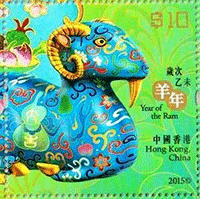 |
 |  |
 |  |
Macau (Goat)
Macau, 1991
Taiwan (Ram)
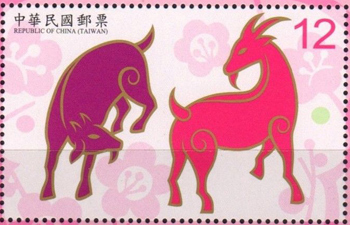 | |
 |  |
Taiwan, 2003

Taiwan, 1979
******
And now for the rest of the world. Every continent is represented.
Aland (Sheep)
Aitautaki, Cook Islands (Sheep)
 |  |
Australia, Christmas Island (Goat)
 |  |
Azerbaijan (Goat)
Bhutan, 2003 (Sheep)
Canada (Sheep)
 |  |
Cook Islands (Sheep)
 |  |
France (Chèvre, most commonly goat)
Ghana (Goat)
Ghana chose to mark the year of the goat with paintings by the great Qi Baishi (1864-1957). This will no doubt make the stamp a favorite among Chinese collectors, but also perhaps among those entrusted with “guiding public opinion.” One of China’s heavily promoted films last year was The Story of Mao Zedong and Qi Baishi (《毛泽东与齐白石》) featuring Tang Guoqiang and Liu Zifeng in the lead roles.The film depicted Mao and the new Communist-led government as being concerned about the well-being of artists and intellectuals. Tang joined us at USC and talked about "being Mao" when the film was screened here last fall.
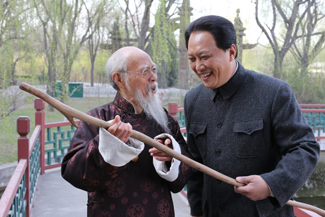 | 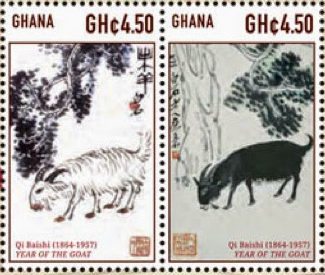 |
Gilbrator (Goat)
Grenada, Carriacou and Petite Martinique (Ram)
 |  |
Guernsey (Goat)
Indonesia (Ram)
Isle of Man (Sheep)
Japan (Sheep)
 |  |
Japan, 1979
Japan, 1967
Jersey (Ram)
Korea, North 
Korea, North, 1991
Korea, South (Sheep)
Korea, South, 1991
Korea, South, 1979
Korea, South, 1967
Kyrgyzstan (Sheep)
Liberia (Ram)
Liechtenstein (Goat)
Madagascar (Goat)
Malaysia, 2003 (Southern Serow - a variant of a species also found in China)
 |  |
Micronesia (Ram) - gold foil
Mongolia (Sheep)
Mongolia, 1972 (Yak? part of a space oriented set)
New Zealand (Sheep)
 | 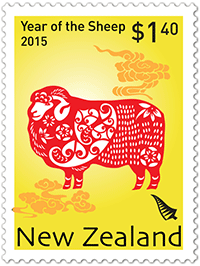 |
 |  |
Niuafo’ou (Sheep)
 |  |
Philippines (Goat)
Samoa (Sheep)
Sierra Leone (Ram)
Singapore (Goat)
Slovenia (Goat)
Solomon Islands (Goat)
 |  |
Thailand (Goat)
Togo (Goat)

Tonga (Sheep)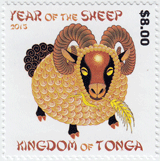

United Nations
It is striking that while several member states and hundreds of millions of non-Chinese mark the lunar new year, the UN postal authority chooses to refer to the occasion as Chinese new year.

Uruguay (Goat)
Uruguay, 2003
Vietnam
 |  |
Want more lunar new year stamps?
2022: Year of the Tiger
2021: Year of the Ox
2020: Year of the Rat
2019: Year of the Pig
2018: Year of the Dog
2017: Year of the Rooster
2016: Year of the Monkey
2015: Year of the Ram/Goat/Sheep
2014: Year of the Horse
2013: Year of the Snake
2012: Year of the Dragon
2011: Year of the Rabbit
2010: Year of the Tiger
2009: Year of the Ox
Upcoming USCI events include a March 4 presentation by author Mike Meyer on In Manchuria, his new book. Meyer's The Last Day's of Old Beijing is among the most popular work on how people have experienced the rapid changes of the past decade. On April 3 at the Shangrila Pudong Hotel in Shanghai, we are hosting a symposium on the values and attitudes of Chinese and American young people. We hope that you'll  join us in Los Angeles or Shanghai.
join us in Los Angeles or Shanghai.
In the meantime, please drop by our web magazines, US-China Today and Asia Pacific Arts. APA has launched its Bullet Train podcast. The latest episode involves a search for lunar new year jokes.
Our calendar below covers events and exhibitions across North America. Please share Talking Points with friends. And please subscribe / like / follow us at our social media pages. The links are below. We are always delighted to hear from you at uschina@usc.edu
Happy New Year!
Best wishes,
The USC U.S.-China Institute
-- a program of the Annenberg School for Communication and Journalism
china.usc.edu
Donate to USCI via the USC secure server.
Click here to subscribe to Talking Points.
Write to us at uschina@usc.edu.
We're at YouTube, Facebook, Twitter, and iTunes.
Events
USC | California | North America | Exhibitions
Click here to visit the full USC U.S.-China Institute calendar.
USC Events
3502 Watt Way
Los Angeles, CA 90089
Free, please RSVP here.
Time: 4:00-5:30pm
UC San Diego, The Great Hall
San Diego, CA 92093
Time: 5:00-6:30pm
The Center on Emerging and Pacific Economies (EmPac) at UCSD presents a talk by Jorge Guajardo, former Mexican ambassador to China, on China's economic and political relations with Latin America.
02/19/2015: Chinese New Year Celebration
House of Blues, Foundation Room
8430 Sunset Blvd.
Hollywood, CA 90069
Time: 7:00pm
If you couldn't make it out to the last event, come out to this one! It's going to be even better! Zion Lion is going hard again in the Foundation Room to celebrate Chinese New Year 2015!
02/19/2015: Chinese New Year from Tchaikovsky to Tan Dun
Walt Disney Concert Hall
111 South Grand Avenue
Los Angeles, CA 90012
Time: 8:00pm-12:00am
The LA Phil celebrates Chinese New Year with an eclectic blend of East and West. Joined by prominent Chinese artists, the orchestra will play music by Chinese composers (Li Huanzhi, Tan Dun) as well as traditional masterpieces by Saint-Saëns, Chopin and Tchaikovsky
Stanford University
Lane History Corner, Building 200, Room 034
Stanford, CA 94305
Time: 10:00am - 12:30pm
The Stanford University Center for East Asian Studies presents a screening of Jenny Chio's "Peasant Family Happiness," which depicts the everyday experience of "doing tourism" in two rural, ethnic minority villages in contemporary China.
02/20/2015: Screening of Plastic America
UC Berkeley, 180 Doe Library
Berkeley, CA 94720
Time: 4:00-6:00pm
The Center for Chinese Studies at UC Berkeley presents a documentary by Wang Jiuliang about the recycled plastic industry.
02/20/2015: Hukou Reform and Rural Dispossession in China
UC San Diego
IR/PS Robinson Building Complex, Room 3201
San Diego, CA 92093
Time: 4:30-6:00pm
The 21st Century China Program at UCSD presents a talk by Joel Andreas on the evolution of the hukou system, focusing on access to rural land and considering the implications for the rural population of the current shift from hukou-based to market-based land rights.
02/21/2015: Hukou Reform and Rural Dispossession in China
UC Irvine
Social and Behavioral Sciences Gateway, Room 1321
Irvine, CA 92093
Time: 2:30-4:00pm
The UCI School of Social Sciences presents a talk by Joel Andreas on the evolution of the hukou system, focusing on access to rural land and considering the implications for the rural population of the current shift from hukou-based to market-based land rights.
2/23/2015: Xi Jinping's Rule of Law at Home and In the World
UC Irvine, MPAA Executive Commons
401 East Peltason Drive
Irvine, CA 92697
Time: 2:00-4:30pm
The John S. and Marilyn Long U.S.-China Institute for Business and Law welcomes Professor Jerome A. Cohen. Professor Cohen will present his thoughts on the development of law in China, discussing implications both for domestic as well as international context.
2/24/2015: The Rule of Law Under Xi Jinping
UC San Diego
IR/PS Robinson Building Complex, Room 3201
International Lane & Thurgood Marshall Lane
San Diego, CA 92093
Time: 5:00-6:30pm
Fudan-UC Center on Contemporary China and the 21st Century China Program at UCSD present a talk by Jerome Cohen on Xi's reforms in the legal systems and the important advances that came about.
02/24/2015: Screening of Lessons in Dissent
UCLA, Charles E. Young Library Main Conference Room 11360
Los Angeles, CA 90095
Time: 7:00-9:00pm
The UCLA Center for Chinese Studies presents a documentary screening by Matthew Torne on "Lessons in Dissent," which tells the story of a generation of Hong Kongers dedicated to creating a new more democratic Hong Kong.
02/25/2015: Building China: The rise of informal precarious work in China's construction industry
UCLA, Public Affairs 5391
405 Hilgard Avenue
Los Angeles, CA 90095
Time: 12:30-2:00pm
The UCLA Center for Chinese Studies presents a talk by Sarah Swider from Wayne State on the migrants in precarious work in China's construction industry.
02/25/2015: Comfort Women Wanted
UCLA, Bunche Hall 10383
405 Hilgard Avenue
Los Angeles, CA 90095
Time: 2:00-4:00pm
The UCLA Center for Korean Studies presents Chang-Jin Lee' project "Comfort Women Wanted," which is based on his interviews in different countries in Asia with "comfort women" survivors and a former Japanese soldier.
02/25/2015: Lunar Celebration and Trade in the Asia Pacific
Crown Plaza Costa Mesa
3131 Bristol Street
Costa Mesa, CA 92626
Time: 5:15-9:00pm
The World Affairs Council of Orange County will be celebrating the Year of the Goat by having a special cultural performance by the Irvine Chinese School followed by a Panel Discussion on Trade in the Asia Pacific.
03/02/2015: Dunhuang and the Silk Road: Imperial Archaeology to Digital Reunification
UC Berkeley, 180 Doe Library
Berkeley, CA 94720
Time: 4:00-6:00pm
The Center for Chinese Studies at UC Berkeley presents a colloquium with Susan Whitfield on the International Dunhuang Project, an international collaboration to make art from Dunhuang Road freely available on the Internet.
02/18/2015: Dean's Forum on The Journey to the West
Divinity School, Swift Common Room
Chicago, IL 60637
Time: 12:00-1:15pm
Dean's Forum on the new edition of "The Journey To The West" by Anthony C. Yu, Carl Darling Buck Distinguished Service Professor Emeritus, with responses from Wendy Doniger, Mircea Eliade Distinguished Service Professor of History of Religions, and Brook A. Ziporyn, Professor of Chinese Religion, Philosophy, and Comparative Thought.
02/18/2015: China's New Governing Party Paradigm: Political Renewal and the Pursuit of National Rejuvenation
The George Washington University
The Elliott School of International Affairs, Room 211
1957 E Street, NW
Washington, DC, 20052
Time: 12:30-1:45pm
The Sigur Center for Asian Studies presents a book talk by Timothy Heath.
02/18/2015: China's Super Consumers 2.0: Changing China-Changing the World
Asia Society Texas
1370 Southmore Blvd.
Houston, TX 77044
Time: 6:00-8:00pm
In this interactive presentation, Chan and Zakkour will offer an in-depth explanation of what Globalization 2.0 is, what China’s and Alibaba’s role in this new world is, and how Chinese consumers and companies are changing China and changing the world.
02/18/2015: Fabricating the Future: Coastal Cuttlefish, Magnesium Carbonate, and a Strong Dose of Vernacular Industrialism in Early Twentieth-century China
University of Texas at Austin
AVAYA Auditorium, Peter O'Donnell Jr. Building (POB) 2.302
Austin, TX
Time: 7:00-9:00pm
Dr. Eugenia Lean will examines the intersection among vernacular science, commerce, and the ways in which knowledge and things are authenticated in an era of mass communication.
02/19/2015: A River Flows Through It: Transboundary Waters in China-India Relations Rising China and Japan’s Future: Seeking a Way to Co-Exist
University of Washington
Allen Auditorium, Allen Library
Seattle, WA 98195
Time: 3:30-4:30pm
Dr. Selina Ho’s research focus is on politics and international relations, with an area specialty in China Studies.
02/20/2015 - 02/22/2015: Duke-UNC China Leadership Summit 2015
Duke University & the University of North Carolina at Chapel Hill
Durham, NC 27710
The Duke-UNC China Leadership Summit is an annual student-run conference organized by Duke University and the University of North Carolina at Chapel Hill. We invite leading experts to speak on topics of importance to Sino-US relations and create a platform for students from across the globe to exchange perspectives on these issues, connect with speakers, and network with one another.
02/20/2015: Doing Business in China
Asia Society Texas
1370 Southmore Blvd
Houston, TX 77004
Time: 9:00am-12:00pm
The Chinese Community Center will provide a “crash course in Chinese” that provides learners the opportunity to understand the basic foundations of Mandarin in addition to a few common greetings and phrases.
02/21/2015: Chinese Music Virtuosi: A Lunar New Year Musical Celebration
University of Hawaii at Manoa
Orvis Auditorium Music Department
2411 Dole Street
Honolulu, HI 96822
Time: 7:30-9:30pm
Featuring musicians from Hong Kong's renowned ensemble, Chinese Music Virtuosi, together with talented local guests in a program of traditional Chinese instrumental music and contemporary works, including world-premiere compositions by Hawai'i and Hong Kong composers.
02/27/2015: The Problem of Commemorating: Epitaph Writing and Filial Expression in the Northern Song (960-1125)
Yale University, Henry R. Luce Hall, RM 202
34 Hillhouse Avenue
New Haven, CT 06510
Time: 12:00-1:30pm
The Council on East Asian Studies at Yale University presents Cong Ellen Zhang speaking about the growing complexities in filial expectations and performance as well as the intricate realities of elite social networking.
03/02/2015 - 03/06/2015: University of Oklahoma Chinese Language Film Festival
University of Oklahoma, Fred Jones Art Museum Auditorium
555 Elm Avenue
Norman, OK 73019
The University of Oklahoma (Norman, OK) is hosting a Chinese Language Film Festival, March 2-6, 2015. The Film Festival consists of three film screenings, a Chinese Language Film Salon, and a symposium on Chinese language cinema and the 4th Newman Prize laureate Chu T’tien-wen
03/04/2015: Screen Asia-The Land of Many Palaces: China's Ghost City Awakened
Asia Society Texas
1370 Southmore Blvd
Houston, TX 77004
Time: 7:00-11:00pm
In Ordos, China, thousands of farmers are being relocated into a new city under a government plan to modernize the region.
02/19/2015 - 05/24/2015: High Tea-Glorious Manifestations East and West
Norton Museum of Art
1451 S Olive Ave
West Palm Beach, FL 33401
The Norton Museum of Art presents an exhibition of objects which illustrate important events in tea culture.
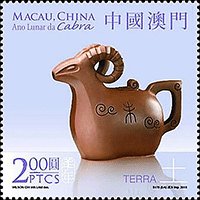
USC U.S.-China Institute
3502 Watt Way, ASC G24
Los Angeles, CA 90089-0281
Tel: 213-821-4382 | Fax: 213-821-2382 | uschina@usc.edu | china.usc.edu

